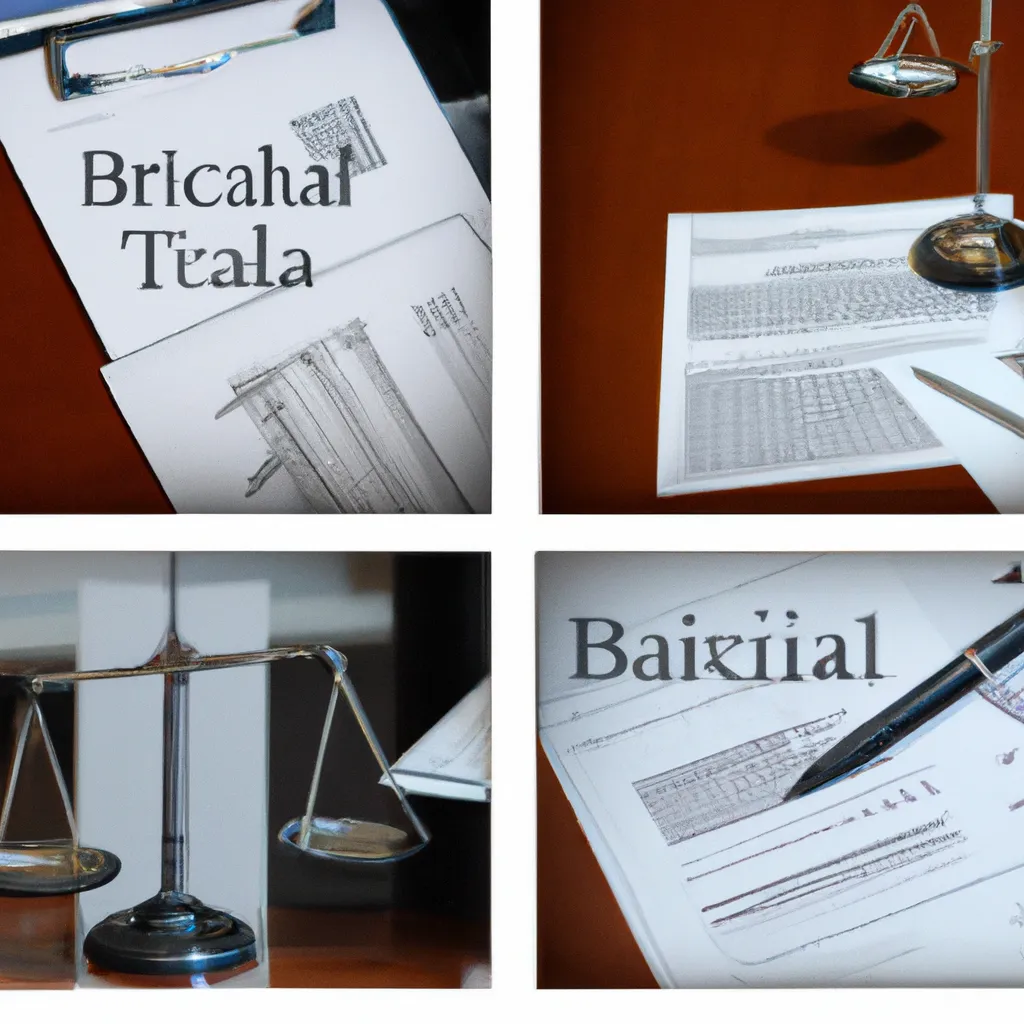Are you tired of spending hours on end trying to reconcile your business' finances in New York City. Look no further than Trial Balance to streamline your bookkeeping process. Trial Balance is a popular tool used by many businesses in New York City to easily organize, review, and reconcile their financial data. It offers a comprehensive view of your company's financial health, making it much easier to spot any discrepancies or errors.
With its user-friendly interface and simplified tracking system, Trial Balance can save you time and effort, allowing you to focus on other crucial aspects of your business. Say goodbye to the stress and confusion of bookkeeping in New York City. Trial Balance has got you covered. Don't just take our word for it – experts in the industry also recommend using Trial Balance for efficient bookkeeping solutions.
With its proven track record and ease of use, Trial Balance is a valuable asset for any business looking to streamline their bookkeeping process. So why wait. Start using Trial Balance today and see the difference it can make for your business in New York City.

Introduction to trial balance and its importance in bookkeeping
Bookkeeping is an essential aspect of any business, whether small or large. It involves systematically recording, organizing, and summarizing all financial transactions to provide accurate and up-to-date financial information. One crucial tool used in bookkeeping is the trial balance, which plays a significant role in ensuring the accuracy of a company's financial records.
Understanding the basics of trial balance
A trial balance is a statement that lists all the general ledger accounts and their respective balances at a specific point in time. It is usually prepared at the end of an accounting period, such as a month, quarter, or year, to check the accuracy of the recorded financial transactions. The main purpose of a trial balance is to detect any errors in the accounting process, such as omissions, incorrect figures, or misclassifications.
The trial balance follows the double-entry bookkeeping system, which means that every transaction is recorded in at least two accounts, with one account debited and the other credited. This system ensures that the total debits always equal the total credits in the financial records. Hence, the trial balance should have an equal sum of the debit and credit balances.
For example, if a company purchases office supplies for $500 on credit, the general ledger account “office supplies” will be debited for $500, and the “accounts payable” account will be credited for the same amount. When preparing a trial balance, these two accounts will have a debit and credit balance of $500, respectively, balancing each other out.
How trial balance helps streamline your bookkeeping process
Maintaining a trial balance is crucial as it helps identify any discrepancies in the financial records. If the two columns of the trial balance do not balance, it indicates that there are errors in the bookkeeping process that need to be addressed. The earlier these errors are identified, the easier it is to rectify them.
Moreover, having a well-organized trial balance can save time and effort when preparing financial statements, such as an income statement or balance sheet. Since the trial balance already lists all the accounts and their balances, it makes it easier to transfer the information to the respective financial statements.
In addition, a trial balance can also be used as a tool for internal control. It allows business owners or managers to review the accounts and their balances, making it easier to detect any unusual activity or potential fraud.
The impact of a well-maintained trial balance on estate planning
Estate planning involves the preparation of legal documents that specify how an individual's assets will be distributed after their death. Having a well-maintained trial balance is crucial in estate planning, as it provides a clear and accurate snapshot of the individual's financial situation.
A well-prepared trial balance can help determine the net worth of an individual, which includes all their assets and liabilities. This information is necessary when creating a will or trust, as it ensures that all assets are accounted for and allocated according to the individual's wishes. In the event of any disputes, a trial balance can serve as evidence to support the distribution of assets.
Furthermore, a well-maintained trial balance can also make it easier for estate planners and accountants to file the necessary tax returns accurately and efficiently. This helps avoid any penalties or delays in the distribution of assets to beneficiaries.
Trial balance is a critical tool in bookkeeping that helps ensure the accuracy of financial records and streamline the preparation of financial statements. Its role in estate planning further highlights its importance in providing a clear and accurate snapshot of an individual's financial situation. As such, businesses and individuals should prioritize maintaining a well-organized and accurate trial balance to avoid any complications and facilitate the smooth functioning of their financial processes.

Key elements of bookkeeping for personal tax accounts
The management of personal tax accounts can be a tedious and confusing task for many individuals. Whether you are a sole proprietor, freelancer, or small business owner in new york, new york, keeping track of all your income and expenses, and ensuring they are accurately reported on your tax returns, can be overwhelming. In such cases, proper bookkeeping practices and systems are crucial for maintaining organized personal tax accounts.
One essential aspect of bookkeeping for personal tax accounts is the use of a trial balance. This tool can significantly simplify the management of your tax accounts, making it easier to track and report your finances accurately. In this section, we will explore the key elements of bookkeeping for personal tax accounts and how incorporating a trial balance into your system can benefit you.
How trial balance can simplify personal tax account management
A trial balance is a statement that lists all your company's account balances from your general ledger, including assets, liabilities, and equity. It is used to ensure that all the debits and credits in your accounts are equal and balanced. While it may seem like an additional step in your bookkeeping process, using a trial balance can significantly simplify the management of your personal tax accounts.
By incorporating a trial balance, you can quickly identify any inaccuracies or discrepancies in your accounts. This can help you catch errors before they are reported on your tax returns and save you from potential penalties and fines from the government. It can also simplify the process of organizing and preparing your financial statements, saving you time and effort.
Incorporating trial balance into your bookkeeping system for better tax planning
Proper tax planning is crucial for any individual looking to minimize their tax burden. By incorporating a trial balance into your bookkeeping system, you can get a clear overview of your financial situation and make more informed tax planning decisions.
A trial balance can help you identify which accounts have the most significant impact on your taxes, allowing you to focus on those areas during tax planning. It can also help you track and analyze your expenses, providing valuable insights into potential areas where you can save money and maximize deductions.
The role of trial balance in managing petty cash effectively
Petty cash, also known as cash on hand, is the small amount of cash that is used for daily business transactions. For many individuals, accurately tracking and managing petty cash can be a challenge. However, this is where a trial balance can come in handy.
By keeping a record of all your petty cash transactions in your trial balance, you can easily track and manage your petty cash expenses. This can help you accurately report them on your tax returns and avoid any discrepancies or errors.
Incorporating a trial balance into your bookkeeping system is a vital element in managing your personal tax accounts. It simplifies the process and ensures accuracy, making it a valuable tool for tax planning, managing petty cash, and maintaining organized financial records. Incorporate a trial balance into your bookkeeping practices to better manage your personal tax accounts and stay on top of your finances.
How to implement trial balance in your bookkeeping process
Trial balance is an essential tool in bookkeeping that helps ensure accurate financial records and proper management of a company's finances. It is a snapshot of all the balances in a company's general ledger at a specific point in time, giving business owners and accountants an overview of the company's financial health. Implementing trial balance in your bookkeeping process can be a daunting task, especially for those new to bookkeeping or located in new york, but it is crucial for maintaining a well-organized and efficient financial system.
Step-by-step guide to setting up trial balance in your bookkeeping system
Before diving into the steps for setting up trial balance, it is essential to understand the concept and purpose of trial balance. As mentioned earlier, trial balance is a report that lists all the balances in a company's general ledger. It helps identify any discrepancies or errors in the ledger, ensuring the accuracy of the company's financial records.
To set up trial balance in your bookkeeping system, follow these steps:
Step 1: create a chart of accounts
A chart of accounts is a list of all the accounts in a company's general ledger, used to record financial transactions. It typically includes assets, liabilities, equity, revenue, and expenses. When setting up trial balance, having a well-organized and comprehensive chart of accounts will make the process smoother and more efficient.
Step 2: record transactions in the general ledger
Once you have a chart of accounts, you can start recording transactions in the general ledger. Each transaction should be recorded in the corresponding account, following the double-entry accounting system (debit and credit).
Step 3: prepare the trial balance
After recording all transactions, you can prepare the trial balance by listing all the balances in the general ledger. The total amount of debits should equal the total amount of credits, indicating that the books are balanced. If there is a discrepancy, it means there is an error in the general ledger that needs to be corrected before moving forward.
Step 4: review and adjust any discrepancies
If the trial balance does not balance, you will need to review and adjust any discrepancies. This could be due to errors in recording transactions, wrong account classifications, or missing transactions. Make the necessary adjustments and prepare a new trial balance until it balances.
Tips and tricks for maintaining an accurate trial balance
Maintaining an accurate trial balance is crucial for the financial health of your business. Here are some tips and tricks to help you ensure the accuracy of your trial balance:
- regularly reconcile your bank statements to the general ledger to identify any discrepancies.
- make sure to classify transactions correctly in the general ledger.
- review and adjust any discrepancies before finalizing the trial balance.
- utilize accounting software to streamline the trial balance process and minimize errors.
- regularly review and update your chart of accounts to ensure it accurately reflects your company's finances.
- consistently follow the double-entry accounting system to maintain balanced books.
Common mistakes to avoid when working with trial balance
Despite its importance, trial balance can be prone to errors if not managed properly. Here are some common mistakes to avoid when working with trial balance:
- not reconciling bank statements regularly, leading to discrepancies in the trial balance.
- not classifying transactions correctly, resulting in skewed financial records.
- not reviewing and adjusting discrepancies in the trial balance, leading to inaccurate financial statements.
- using outdated or incorrect chart of accounts, leading to errors in the general ledger and trial balance.
- not following the double-entry accounting system, resulting in unbalanced books.
Implementing trial balance in your bookkeeping process is crucial for maintaining accurate and organized financial records. By following the steps outlined in this guide, avoiding common mistakes, and regularly reviewing and adjusting your trial balance, you can ensure the financial health and success of your business.
The benefits of using trial balance for bookkeeping in new york city
New york city is not only one of the busiest cities in the world, but it is also home to a large number of businesses and individuals who require efficient management of their bookkeeping tasks. Bookkeeping is an essential aspect of any business or individual's financial management, and with the fast-paced lifestyle in new york, it is important to find ways to save time and reduce errors in bookkeeping. This is where trial balance comes in handy. In this article, we will discuss the benefits of using trial balance for bookkeeping in new york city and how it can help maximize efficiency in managing financial records.
Efficiently managing bookkeeping tasks in a busy city
Bookkeeping is the process of recording, organizing, and maintaining financial transactions for a business or individual. It involves tasks such as tracking income and expenses, managing accounts payable and receivable, creating financial statements, and more. In a busy city like new york, bookkeeping can be a daunting and time-consuming task. However, using trial balance can help streamline the process and make it more efficient.
Trial balance is a financial statement that lists all the balances of a company's general ledger accounts. It serves as an internal check to ensure that the total debits equal the total credits. This helps to identify any discrepancies or errors in the books, making the bookkeeping process more accurate and efficient.
In new york city, where time is of the essence, using trial balance can help businesses and individuals stay on top of their bookkeeping tasks without sacrificing accuracy and efficiency. With trial balance, financial records can be organized and managed more effectively, leaving more time for other important tasks.
Saving time and reducing errors with trial balance
One of the biggest benefits of using trial balance for bookkeeping in new york city is its ability to save time and reduce errors. In a busy city like new york, where businesses and individuals have a lot on their plate, time is a valuable commodity. Using trial balance can help to streamline the bookkeeping process and save time that would otherwise be spent on manual calculations and double-checking the books for errors.
Moreover, trial balance serves as a self-auditing tool, which means it helps to identify errors or discrepancies in the books before they become bigger problems. This not only saves time but also ensures the accuracy of financial records. With trial balance, businesses and individuals can rest assured that their books are error-free, which is crucial for making informed financial decisions.
Furthermore, trial balance can help to reduce the chances of human error. While it is not uncommon for manual bookkeeping to result in errors, trial balance minimizes the risk of errors by automating calculations and cross-verification of data. This not only saves time but also ensures the accuracy and integrity of financial records.
Maximizing your bookkeeping efficiency with trial balance
In the bustling city of new york, time is of the essence, and efficiency is key. Therefore, it is important to make the most of the resources available, and trial balance is an efficient tool for managing bookkeeping tasks. By automating calculations and cross-checking data, trial balance helps to streamline the bookkeeping process and make it more efficient. This allows businesses and individuals in new york to maximize their productivity and devote more time to growing their business or managing other tasks.
Moreover, trial balance helps to provide a clear and accurate overview of a company's financial situation. With all the balances of the general ledger accounts listed in one place, businesses and individuals can easily assess their financial standing and make informed decisions based on accurate data.
Trial balance is a valuable tool for businesses and individuals in new york city. Its ability to save time, reduce errors, and maximize efficiency makes it an essential aspect of bookkeeping in a busy city like new york. By using trial balance, businesses and individuals can effectively manage their financial records and make informed decisions to grow and prosper in the fast-paced world of new york city.

